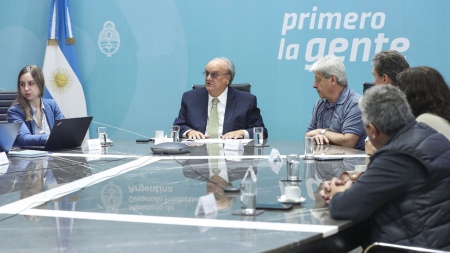The Secretary of Industry and Productive Development, José Ignacio de Mendiguren, and various economists highlighted the country’s compliance with the goals within the framework of the Expanded Service Agreement of the Fund (SAF) with the International Monetary Fund, which makes it possible to pave the way for a disbursement of US$ 6,000 million that will make it possible to pay the maturities planned for the 2018 programme.
De Mendiguren focused on the comments of the IMF technicians who accompanied the third review of the program and questioned that the opposition “does not read” this type of diagnosis.
“The opposition is so unreliable that it doesn’t even read what the IMF says about the Argentine economy,” De Mendiguren criticized in a statement.
The official referred to comments by Luis Cubeddu, deputy director of the Western Hemisphere Department; and Ashvin Ahuja, Chief of Mission for Argentina, who are part of the IMF team in the reviews with Argentina.
“There is a prudent macroeconomic management and gradual ordering in all the variables”Jose Ignacio de Mendiguren
“The prudent macroeconomic management and the efforts to mobilize external financing are supporting macroeconomic stability: fiscal order is being restored, inflation moderating, the trade balance improving, and reserve coverage strengthened,” they said last night when announcing that they reached an agreement at a technical level with the country’s economic team on the third review of the agency’s program.
The agreement paves the way for a disbursement of US$ 6,000 million, which must be approved by the Executive Board of the IMFwhich is expected to meet this month.
“Despite the challenges, also a consequence of the war in Ukraine, all quantitative performance targets were met by the end of September 2022, including the primary fiscal deficit due to strong spending controls and actions to improve the targeting of subsidies. and social assistance”, affirmed the technicians of the Fund, who pointed out, in turn, that “the authorities continue to meet the objectives of the program by the end of 2022”.
They also remarked that “the actions of the new economic team are beginning to bear fruit, inflation is moderating (although from high levels) and the trade balance is improving, largely due to an appropriate slowdown in domestic demand and imports.” ”.
De Mendiguren agreed with the diagnosis, and concluded that “there is prudent macroeconomic management and gradual ordering in all variables.”

Economists highlighted the achievement of the goals
Along the same lines, various economists highlighted the fulfillment of the goals by the Government through the measures implemented in recent months, both in the fiscal and monetary spheres.
“Always meeting a goal with the Fund is important for an economy with as many weaknesses as Argentina because it allows generating expectations that the roadmap -in this case, the agreement with the Fund- will continue to be fulfilled”, emphasized Ricardo Delgado, head of from the consulting firm Analytica in dialogue with Télam.
Although Delgado considered that it will be “challenging” to meet the reserve goal for the fourth quarter at the end of the year, he pointed out that the second edition of the Export Increase Program (PIE) -known as the “soybean dollar”- “can contribute” to that it be achieved.
“Always meeting a goal with the Fund is important for an economy with as many weaknesses as Argentina because it allows generating expectations that the roadmap -in this case, the agreement with the Fund- will continue to be met”Ricardo Delgado
“Possibly we will be comfortable with the reserve accumulation goal (of US$ 5,000 million for this year) and the fiscal deficit when a month and a half ago there were many doubts and uncertainty about whether both objectives could be met,” For his part, the director of Consultora Sarandí, Sergio Chouza, agreed, who also indicated to Télam that with “the new soybean dollar and the results that they have been giving in the first days, it seems that they are going to alleviate that objective.”
Looking ahead to 2023, both economists agreed that economic policy should follow the same path, an aspect emphasized by the IMF in last night’s announcement.
This is the point of view of Cubbedu and Ahuja, who emphasized that a “solid implementation of the program is essential in the future” and that, for this, “it will be essential” to continue with the reduction “of monetary financing.”
“Monetary aggregates, issuance and the base have been falling in real terms,” Delgado explained and indicated that, in the case of spending, it is “20 real points below what it had been growing last year.”
Chouza specified that the country must “extreme efforts” in the coming year to fit within the objectives stipulated by the program.
Meanwhile, Chouza specified that the country must “extreme efforts” in the coming year to fit within the objectives stipulated by the program.
Among them is a reduction of the primary fiscal deficit from 2.5% of the Gross Domestic Product (GDP) in 2022 to 1.9% in 2023.
On the other hand, financial assistance from the Central Bank (BCRA) to the Treasury must go from 1% of GDP to 0.6% in 2023.
Although for Chouza the emission goal for 2023 will be “more modest” by considering a reduction of 0.4 points compared to 2.7 points this year, the reserve goal “becomes a little more aggressive” by foreseeing increase them by US$ 4,000 million.
“Possibly the demand for imports will fall because economic growth will moderate next year. This would allow a greater fiscal surplus and, therefore, consolidate more reserves in the Central Bank”, estimated the economist.


















